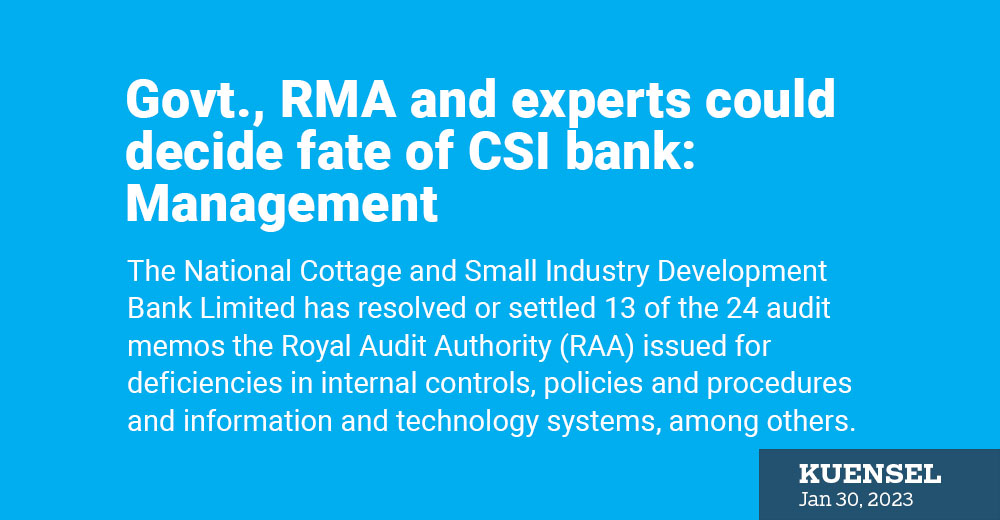The bank resolved 13 of 24 audit
observations
Thukten Zangpo
The National Cottage and Small Industry Development Bank Limited has resolved or settled 13 of the 24 audit memos the Royal Audit Authority (RAA) issued for deficiencies in internal controls, policies and procedures and information and technology systems, among others.
The management has been requested to resolve the remaining 11 pending observations. The RAA in its compliance report for the bank found that the bank’s operation was financially not viable as income was not able to cover the operating cost, hugely depending on the government’s equity injection.
Refuting some of the observations, the Chief Executive Officer (CEO) of the bank, Kinzang said that the bank was established before the first case of the Covid-19 was detected in the country and the bank lived through the pandemic and was hit by it. The bank was established on February 21, 2020.
“Like any other new company, the challenges were varied and unexpected,” he added.
The CEO also said that the bank’s mandate is different from other financial institutions and that profit-making is not the primary goal. “More than 78 percent of the lending was for agriculture and livestock activities, substituting imports,” he added.
Besides, Kinzang said that the bank’s lending rates are very low, as low as 2 percent during the pandemic and that community service centers (CSCs) were integrated with the bank in July 2020.
Kinzang said that the CSCs deliver Government-to-Citizen (G2C) services and hordes of other services to the rural community with very minimal income. Currently, there are 203 CSCs located in gewogs around the country.
The bank’s official said that without CSCs, they would have sustained 100 percent.
Meanwhile, the bank will increase their lending rates soon to sustain their operation and business. “For sustainability of the bank, we have planned to increase the interest rate from the current 5-8 percent to 8-10 percent, this year,” said the CEO.
The RAA highlighted the bank’s high non-performing loans (NPL) with Nu 335.71 million (M) in NPL in 2021, an increase by 279.11M or 493.13 percent from 2020. NPL in 2021 accounted for 15.2 percent of the total loan portfolio.
However, the CEO said that the bank inherited an NPL of 58 percent and 17 percent from the erstwhile Cottage and Small Industries Financing Department (CSIFD) under Bhutan Development Bank Limited (BDBL) and Rural Enterprise Development Corporation Limited (REDCL).
“Despite huge disbursement activities of about Nu 2.24 billion, the bank had streamlined the recovery and monitoring processes and brought down the NPL to 8 percent and 5.23 percent for 2020 and 2021 respectively,” the CEO said.
He added that the erstwhile companies contributed about 70 percent of the NPL, predominantly after the loan deferment was discontinued in June 2022.
On the RAA’s observation of the bank’s function overlapping with the BDBL, the CEO said that the bank’s involvement in its core business of providing credit services and merely channelising the loan applications and equated monthly installments (EMI) to BDBL is not true.
“If this was the case, it would tantamount to a gross violation of prevailing regulatory norms. The Royal Monetary Authority (RMA) conducts on-site inspections every year and such issues never arose,” he added.
On the EMI, Kinzang said that BDBL is just an agent bank and the bank’s current deposit (CD) accounts are maintained with BDBL because the CSI is a non-deposit-taking bank.
He added that the bank through its established credit appraisal process decides all the credit matters.
Responding to the RAA’s report, Kinzang added that most of the issues mentioned in the audit report were procedural in nature and there were challenges in the bank’s core banking system.
He added that the erstwhile REDCL and Business Opportunity and Information Centre (BOiC) memos were also included with those of the bank.
While the recommendation is to relook into the functions of the bank, the CEO said that it is up to the government, RMA, and transformation team to decide whatever is best for the nation. “Whether the bank should merge with BDBL or keep it as a separate entity is up to them,” Kinzang said.
On the audit observations, Kuensel found out that the management was given four days to respond on the bank’s preliminary audit report.
It was also found that the RAA had finalised the report even before the exit meeting was conducted.
However, after the bank’s repeated requests, the exit meeting was conducted virtually with no noticeable change from the initial report.


